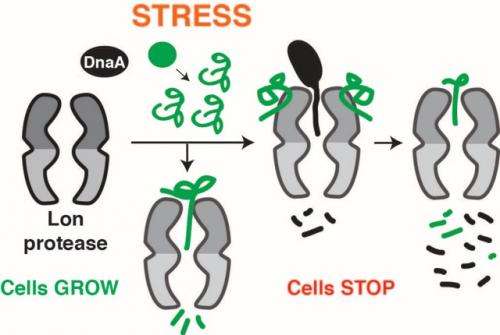Bent out of shape: Stressed bacteria accumulate misfolded proteins and stop growing

(Phys.org) —Whether a man, a mouse or a microbe, stress is bad for you. Experiments in bacteria by molecular biologists in Peter Chien's lab at the University of Massachusetts Amherst, with others at MIT, have uncovered the mechanism that translates stress, such as exposure to extreme temperature, into blocked cell growth.
It turns out that stressful conditions cause some proteins to be literally bent out of shape, or misfolded, and they stop working, says Chien. "You might think of this as microbial temper tantrums. Bacteria deal with stress by destroying proteins. Specifically, we've shown that certain kinds of bacteria respond to high temperatures by destroying proteins needed for DNA replication. Therefore, they stop growing. The signal for this destruction turned out to be the buildup of proteins that were misfolded because of the stress."
Under favorable conditions, cells strive to grow, which means initiating DNA replication. But in stressful conditions, cells must prevent the initiation of replication and instead shift their priorities to protective functions.
As Chien explains, all cells including bacteria contain a huge variety of proteins, molecules that help cells do all the chemical reactions needed for life. Shape determines what kind of functions each protein can perform. Stressful conditions cause some proteins to be misfolded and stop working, stopping growth until the cell copes with the stress. Despite decades of study, until these experiments scientists did not fully understand the molecular mechanisms that cells use to transduce information about environmental conditions to their replication machinery.
In the current issue of Cell, Jing Liu, a graduate student researcher in the Chien lab at UMass Amherst working with the Laub lab at MIT, show that in the bacteria Caulobacter, a particular enzyme, Lon, can help defend against the effects of stress by cutting up and destroying small amounts of misfolded proteins. But when that enzyme encounters too many "bent out of shape" proteins, it starts destroying another perfectly fine protein, DnaA, that normally starts the growth process, that is, DNA replication.
When DnaA was destroyed, cells stop growing. When the stress has passed, the number of misfolded proteins drops, the enzyme Lon would stop destroying the normal protein, and cells would start growing again, the authors found.
Chien says, "In this way, bacteria can respond quickly to stressful conditions, but restart again quickly. Stress and protein misfolding are a universal part of life, so understanding how simple bacteria deal with this kind of stress will help us understand how our cells do as well."
More information: www.cell.com/abstract/S0092-8674(13)00773-3
Journal information: Cell
Provided by University of Massachusetts Amherst



















